|
FAQs about Soft Corals of the Family
Nephtheidae Identification 2
Related Articles: Soft Corals of the Family Nephtheidae,
The Soft Corals of the genus
Dendronephthya, Soft Corals, Order Alcyonacea
Related FAQs: Nephtheid ID 1, Nephtheid ID 3, Nephtheid ID 4, & Nephtheids 1, Nephtheids 2, Nephtheid Behavior, Nephtheid Compatibility, Nephtheid Selection, Nephtheid Systems, Nephtheid Feeding, Nephtheid Disease, Nephtheid Reproduction/Propagation,
Soft Coral Propagation,
Alcyoniids, Dendronephthya, Paralcyoniids, Nidaliids, Xeniids, Soft Corals/Order
Alcyonacea
|
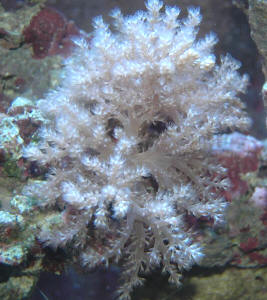
|
|
Identify my picture, Dendronephthya?
5/5/09
Coral ID
Hi,
<Hello Alex>
I have been searching high and low for a picture and supporting
information on this coral I picked up yesterday. Am I right in
believing it is a species of Dendronephthya?
<You are correct.>
The only articles I have found so far are years old, has there
been any advances in keeping this beautiful coral in the home
aquarium?
<Unfortunately, this is a most difficult coral to care for and
most will wither away in a matter of weeks. This coral does not
derive its energy from the byproducts of photosynthesis but feeds
almost exclusively on phytoplankton, and requires both a steady
supply of phytoplankton and sufficient flow to carry the food to
its polyps. Do look/read here.
http://www.wetwebmedia.com/dendornephthyaart.htm>
Thanks,
<You're welcome. James (Salty Dog)>
Alex.
|
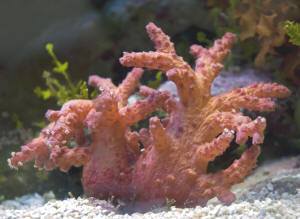 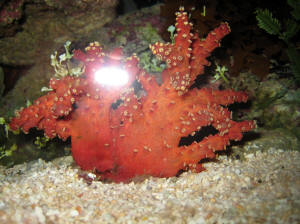 |
|
Carnation coral 4-13-09
Hello again.
<Evening>
Just bought what my LFS called a beautiful 6" carnation
coral. Is this what it is?
<I don't know, is it?><<? RMF>>
I have it slightly under an overhang as I read about low lighting
and the polyps are all open. I target fed it this morning with
concentrated phytoplankton.
<Sclero/Dendronepthea corals do not feed on
phytoplankton...it's anyone's guess as to what they
actually feed upon. There is a 99% chance that this coral is
doomed to a slow starvation in your aquarium, but this species
continues to be imported because ignorant aquarists continue to
buy them without doing their research>
I also read about how difficult they are to keep because of
feeding and wondered if I should take it back.
<Yes, and give your LFS a good tongue lashing, and stick to
online vendors instead (in my opinion)>
I have 3 gorgonians that do very well in my established tank and
will diligently feed the new coral but is it to no avail and will
it eventually die?
<Almost certainly>
Thanks for your advice.
<You're welcome - next time please email *before*
purchasing?>
Tammy
<Mike Maddox>
|
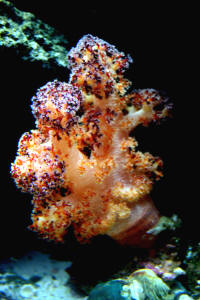 |
|
Re: carnation coral
4-19-09
Thanks for the reply. I do a lot of research before I buy so I
think I buy "researching ahead" but this one had just
came in and was very nice looking so I bought and then did the
research. Everywhere I read said they feed on mass amounts of
phytoplankton so that's what I started feeding it. I will
take it back but I'm sure they will just turn around and sell
it again without considering anything I tell them but hopefully
they will... they are a bigger localized chain.
<One of the many reasons I detest LFS/pet
stores><<Bears self-examination. RMF>>
It's too bad that these cannot be kept in a closed system...
it is so pretty.
<Agreed. Even the Waikiki aquarium tried and failed to achieve
above a 50% success rate, even pumping NSW through their systems
daily>
Thanks again.
<Anytime>
Tammy
<Mike Maddox>
Re: carnation coral 4-20-09
Hey Mike. I did take it back and talked with the manager about
this coral.
She had never heard of this and said she was going to talk with
the supplier about sending difficult corals to sell. Well, I went
in there yesterday and she told me that the supplier did tell her
that this was for "experts only" and he wouldn't
send any that weren't easy to keep so thanks for helping me
help them not to sell these delicate corals.
<That's awesome, I'm glad to hear the LFS listed to
you! Thanks for making the extra effort to reduce coral
mortality, Tammy. Myself and your fellow hobbyists all appreciate
and can learn from your gesture>
Tammy
<Mike Maddox>
|
|
Coral ID help 2/18/09 <Hi Gabriel, Minh at
your service.> Hello crew. Just need a little help with a
coral I can't identify. I got this piece from my LFS when I
purchased a few other things and they put this in there by
mistake. I've been doing a lot of reading and looking at
pictures and still can't figure out what this type of coral
is. It has been in my tank for over a few months and seems to be
receding. The branches on it where longer and more defined at one
time. This coral glows bright fluorescent green under actinic
lighting. Any help you could give me in identifying this coral so
I can research how to better care for it would be a great help.
<Based on the picture you've sent, it appears to be a
Nephtheid. If you browse through this page, you can identify
which genus it best resembled when it was healthy:
http://www.wetwebmedia.com/nephtheids.htm. Care and husbandry
information is available in those pages as well.> Thanks,
Gabriel <You're welcome. Cheers, Minh Huynh.>
|
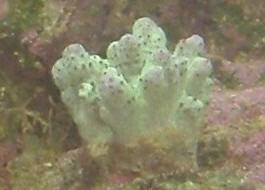 |
|
Unknown algae growth and unknown coral
03/28/2008 Hello Guys and Gals. Thank you once again for all
of your help! <<G'Morning, Andrew today>> I have
an algae growth that none of my LFS can seem to tell me what it
is. It shows up on my sand bed after the lights come on and seems
to grow patches within the first couple hours and grows
throughout the day. After the lights go out, it seems to diminish
a great deal over night. I'm not sure if it's being eaten
by my snails and hermits but it is a lot less in the a.m. before
the lights come back on. It looks black in the tank on the sand,
although I have removed some before and put in a bag to take to
my LFS and it sat in the bag for a couple days and turned the
water in the bag pink! Then the water turned clear eventually. It
has a very fine hair like look when stirred up. <<Yes, its
a red hair algae, from what I can see in the picture. There is a
good possibility that your snails are keeping this under control.
The tufts on the substrate can easily be syphoned out>> I
have a 65 gallon tank. 3 1/2 month old, 75 lbs. live rock, 3
circulating powerheads w/ a total 1000 gph circulation. (3) 96
watt lights equaling 50% blue and 50% daylight. Night light is a
submergible LED blue strip lights. <<For a reef tank, you
may want to up your flow a little, get yourself into the region
of 1600gph>> Water parameters are 0 ammonia, 0 nitrites,
calcium, 480-500, nitrates are questionable, I get about 20-30,
LFS test 0, PH 8.2, salinity 1022-1023. I use Oceans Blend for
Calcium, PH, Alkalinity. Had phosphate tested today and they said
very minimal. <<Usually with plague algae, they have
already absorbed the phosphates from the water, so, a test
showing up minimal is common. Have you tested the water before it
goes in the tank? If not, give it a test, see what it
shows>> I have several small frag corals, mostly soft
coral, but some candy cane coral, one Bubble tip anemone and a
fair size frog spawn. I also bought a coral today that the LFS
told me was a Cotton Candy Coral. <<I would concur on the
carnation coral. They are not the easiest to keep, however, with
research and understand, you should be fine>> It has
extended out at least two inches since I put it in. Now that I am
looking online, it looks like a carnation coral! They say that
they are difficult to keep. Mine seems very happy in the few
hours I have had him but now I am afraid that I won't be able
to keep him alive! Included is a pic of it as well. Can you
identify this coral? <<As above>> Fish include: 1
Dwarf Coral Beauty 1 Six Line Wrasse 1 Lawnmower Blenny 3 Blue
Green Chromis 1 Midas Benny 2 Mated Percula Clowns Inverts: 1
skunk cleaner shrimp 20 Nassarius snails 2 large Mexican Turbo
Snails 4 very large stocky Cerith Snails? The ones that burrow
under the sand I pulled some of the algae out and put in a bowl
for you to take a look at. Please tell me what this is. I have
been told may be hair algae, another told me red slime. Another
place said they don't know what it is, they have never seen
it. Will you please take a look at the pics attached and tell me
what YOU think. Also, what kind of coral in the other pic. Thank
you for all you do for us! Rachel <<Thank you for the
questions, hope this helps. A Nixon>>
|
|
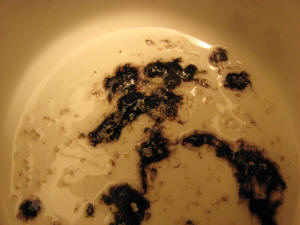 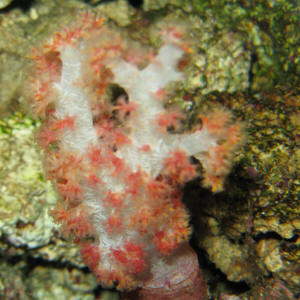
|
|
Was: Urchin Hitchhiker: Pencil Urchin, Now Nephtheid ID -
2/3/08 Thanks, Lynn! <Hi Andy! You're most
welcome!> I believe you are right on the money on both counts.
<Woohoo!> After reviewing the pictures you sent me, I can
now see the rings around my urchin's spines, so I believe it
is indeed a E. metularia. Also, I agree on the Capnella ID. Since
you're 2 for 2, I thought I would also send you two pictures
of what was sold to me as a Lemnalia tree coral. <Okay,
neat.> When I was looking at the Capnella link you sent me, I
noticed the WWM picture of the Dendronephthya (attached for
reference). The lines in the stalks of the Dendro <Calcareous
spicules called 'sclerites'.> makes me worry that I
actually have one rather than a Lemnalia, as my tree coral also
has these lines running through its stalks (the picture of the
Lemnalia on WWM is not very clear and an internet search revealed
a ton of different looking pictures). <That can be
frustrating, I know. Unfortunately, softies aren't exactly
one of my strengths, but after doing some research, I'm
inclined to think that your coral is indeed a Lemnalia. I'll
need for you to take a close look around the polyps to confirm,
though. Regarding the visible lines/sclerites in the stalk,
apparently Lemnalia has those as well. Where it differs from
Dendronephthya is that the sclerites are not as apparent (if even
present) around the polyps. Dendronephthya, on the other hand,
has them surrounding the polyps, sometimes even extending beyond
them - giving them an almost cactus-like appearance. That's
what you'll need to look for in your coral. One other issue
is the muted color of your coral. This is more typical of a
Lemnalia. I'm hoping Bob will correct me if I'm wrong,
but I'm thinking that what you have is very likely a
Lemnalia.> Thanks! (I promise that I'm done bugging you .
. . for now!) <Heheee! Not too worry, we're always happy
to help.> Andy <Take care. -Lynn>
Re:.. Now Nephtheid ID - 2/3/08 Lynn, <Hi Andy!>
The sclerites are definitely not evident at the polyps. <Whew,
good. I really don't think it's a
Dendronephthya.><<RMF does>> This, and the fact
that my coral has survived for a long time, leads me to believe
you are right yet again. <Well, we both learned something with
this query! I'm just glad that it's not a Dendronephthya
sp.. They're beautiful, but so very difficult to keep.>
Thanks for all your help. I really appreciate your time. Andy
<You're very welcome, Andy. Take care. --Lynn>
|
|
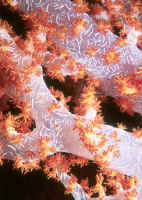 .JPG)
|
Re: Urchin Hitchhiker 2/4/08 Lynn, <BobF here
following on> The sclerites are definitely not evident
at the polyps. This, and the fact that my coral has
survived for a long time, leads me to believe you are right
yet again. Thanks for all your help. I really appreciate
your time. Andy <Actually, the white
"squiggly" things in the translucent tissue are
sclerites. See a referent on the Net, books... BobF>
Re: Dendro ID 2-4-08 Dear Bob,
<Andrew> Thanks for following up--I appreciate the
input. I see from the recent WWM posting that you believe I
indeed have a Dendronephthya. Ugg! I purchased this
specimen about 7 months ago <You've done well to
keep this specimen this long, I assure you... and encourage
you to write up your experience here... What is it about
your set-up, feeding, maintenance... that allowed this
organism to live? Is it oriented "upside down",
in a darkened area?> from That Fish Place in Lancaster,
PA, which is reputed to be a fine and trustworthy LFS.
<It is IMO. I have visited there, talked directly with
the owner> It was labeled as "Lemnalia sp." My
display is a 110g (48" x 30" x 18").
Lighting is by 2x250W HQI (20,000K) and 4x65W actinic PCs.
This coral sits in the bottom third of my tank, and the
HQIs are about 7" off the surface of the water. I have
target fed this coral Cyclop-Eeze as I do with my Capnella.
This coral has grown since I purchased it, both in size and
in polyps (albeit slowly) and otherwise "appears"
very healthy. <Great> I take this is a good sign, but
I am now very worried that I may not be doing all I
can/should be doing for this creature. <... I assure
you... far less than 1% of specimens live a month in
captivity... You are doing most "things
right"> I employ an in-line 30g refugium that is
teaming with pods. At night, I can see many pods swimming
around my display. I will now go back to the drawing board
and do some research on this animal's needs, but is
there any food product in particular that is well-suited
for this coral? <Mmm, there were some experiments that
Charles Delbeek and co. did out at the Waikiki Aquarium
years ago, but I don't recall off-hand where the
results were posted, and if memory serves, they were pretty
inconclusive... As stated, your situation, the make up of
the refugium... something/s are going very well for this
specimen in your system.> As always, thanks for your
time. Andy <Welcome. Bob Fenner>
Re: A nice piece on a successful keeping
of Dendronephthya, maybe Neospongodes 3/3/08 Dear Bob,
<Andy> I posted pictures of my Dendro on a Reef
Central thread specific to Dendros, and the guys/gals on
that message board believe that my coral is not a
Dendronephthya sp., but a Neospongodes sp. Just thought you
might be interested in remaining in the loop on this.
http://www.reefcentral.com/forums/showthread.php?s=&postid=11999623#post11999623
http://www.reefcentral.com/forums/showthread.php?s=&threadid=1292781
Andy <Is a possibility... Nephtheids raised in
captivity... gross morphology can be hard to discern to
genus... Again, dissolving a bit of the proximal body,
measuring sclerites, their preponderance in shape, size...
BobF>
|
|
Re: Urchin Hitchhiker: Pencil Urchin -
1/31/08 Hey Lynn, thanks for the quick reply. Your response was
very helpful/reassuring. <You're very welcome. I'm glad
I could help.> And . . . You were right--a check on the tank
this morning before the lights came on revealed that the urchin was
indeed roaming out of his safe haven. I found him attached to the
back of my tank (presumably munching on some algae/coralline). I
was able to take a picture of him, although it's not great
because I was trying t balance a flashlight and manually focus and
zoom my Nikon at the same time. <Heeeheee! What fun that must
have been! I do appreciate your efforts though. Let's see if we
can't figure out what you've got!> What's your best
guess? <Hmmm, well I can certainly understand your thinking that
this is either a Eucidaris tribuloides or a Heterocentrotus
mammillatus. There are certain characteristics it shares with each.
My best guess is that it's something in the genus Eucidaris,
possibly E. metularia (an Indo-Pacific species). Take a look at
this photo for comparison:
http://www.botany.hawaii.edu/basch/uhnpscesu/htms/kalainvr/fish_pops/cidarid/urchin01.htm
Your urchin has the same shape to the tapering spines and basic
look to the body, with the obvious lines/lighter areas between the
spines. In comparison, Heterocentrotus spp. bodies can have an
almost shingled, or armored appearance. This is due to a covering
of flat(ish) short spines. Now that we're pretty sure it's
in the genus Eucidaris, I can tell you that these urchins are
omnivores. I would offer it seaweed sheets/Nori as mentioned
before, sinking pellets, and the occasional clam/mussel 'on the
half shell'. The idea is that if you keep it well fed, it will
hopefully leave your other livestock alone!> I have also
attached a picture of my yet-to-be-identified tree coral that I
mentioned in my previous mail. Any ID information on this coral
would be much appreciated as well. <It looks like a Capnella
sp./Kenya Tree Coral to me. Nice looking coral! Please see these
links for comparison: http://www.wetwebmedia.com/nephtheids.htm See
the photos within the first continuing query here:
http://www.wetwebmedia.com/nephdisfaqs.htm > Andy
<Have a great weekend! Take care. --Lynn> |
|
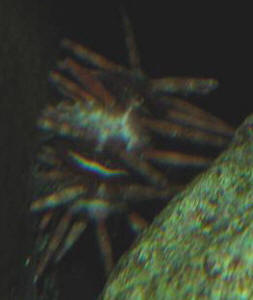 
|
|
|

